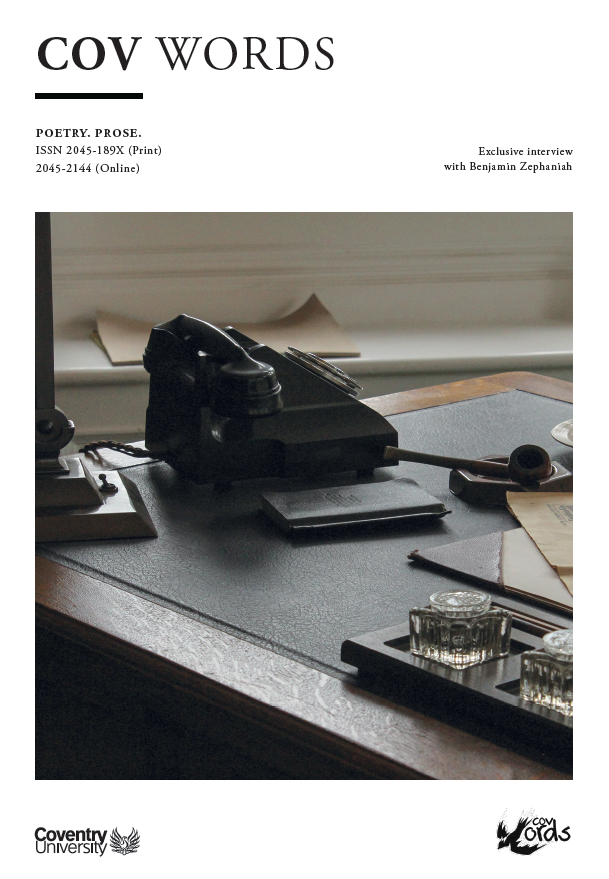Samuel Ugbechie is the winner of this year’s Frederick Holland Poetry Collection Award with his poems on quirky topics from ants to lemonade! The collection is full of powerful visual imagery using astute observations along with eloquent phrasing and his own unique style. We will be celebrating with Samuel on 2nd November, 2016, and presenting this year’s prize money of £1000. He is currently studying for an MSc in Computer Science. You can also find his winning collection in the printed Coventry Words magazine. Congratulations Samuel!
LEMONADE
It’s a heavy Thursday, and a scattering of species—
plants, birds, fishes and mammals—are out everywhere
to carry it. She works in the garden, weeding every spot,
taking a spade to her past, where the memories are fire-
weeds and fleabanes. She spades them with the compost,
and tries to love the ground again. Behind her, a little kid
watches and sings, an old song he’d learned from her,
sounding like the cluck of a chicken, and at times, like the click
of a dolphin. She feels the texture of the ground, hard
as her husband’s soul, which all the spades of her words
and love, all the shovel of her looks and glance,
could never dig. But still she works the garden—taking her time
like the millipede by her left foot, whose body is like a rail,
travelling at a speed it alone imagines and believes.
She appreciates the painting of the sun, applying an up-
stroke of rays, over the screens and louvers and water.
And then she wonders, were it to crawl into her home,
late one night, disguised as half moon, would it be willing
to repaint their unsightly home into a cityscape of beauty?
Perhaps such a sharp painting would pierce her husband’s
heart. And then all the sorrow and grief would leak from it.
Perhaps such a painting would give him something else
to inhabit, instead of staring all night at a planet of a past
he alone sees. Weeding, to her, is refining. And she puts
her fire into it, and uses the oil of her sweat gently.
She weeds the ground and weeds her home. At night,
she hugs him, and sprays the smell of her love on him,
and plants another seed of hope. Such nights, the minutes
are mute, the clock hands are tired, and the moon casts
a spell on the bed she hopes they’d share again.
TWO ANTS AND THEIR LAVA OF LOVE
Two metals that couldn’t alloy. Two shiny elements—
malleable, ductile, broadloom like a rug. At the corrosive
city where their love burned, where beauty wore out
with the erosion, the waves were caustic, each making
its own statement, each its own smith, its own fire,
railing on their barbed passage, and licking up the moisture.
Arsonists in marriage. Evening like a firefighter, armed
with the wind, pulling and pumping against the smokes,
extinguishing at the shock of onlookers—old and young
pouters, drunk rodents, pewter-like birds and passersby,
holding a phrase or two on their tongues, and hissing along.
Ranids mourned. Kittens scoffed as they passed, shutting
their eyes against their owners, purring at the crossing.
There were Saturdays that wouldn’t sleep and slip
into Sunday. Incorrigible days, as colorfast as contempt.
But soon the metals did melt, and then mixed, and shone
like gold. It took the lava of love, with all its madness
and magma, with all its haven and heat, to break them.
It took a line of pain, to tell a full story of suffering—
a thing they hope never to read again, or write again,
or publish at their gate for the other species to read.
DAY LONG
A road like a line, drawn, sketched with the hand.
Paths attach themselves like hands, and some
like branches and twigs. Each day, walking on them,
they pull my gaze to their grapes of sorrow, their shades
of toil and cold. Each life is like a fruit, plucked from somewhere,
ripening in the sun, and the rain. Each life holds a taste—
sweet, bitter, sour. Each life spins its own web, and after a time,
breaks at its own backyard. At times, watching the bright linen
of clouds outside my house, I imagine what life would be
as a rock dove. Far from a rock star, I guess, or a stunt pilot,
or an aviator. Far from tasting an ice cream of cloud,
or from running on the bright blue tunnel of the sky. Each life soaks
in the rain, as though the world were a hot tub, and our bodies
were being washed. Sometimes, a life is just a word spoken,
or a breath inhaled. At times, it’s a cry of a little child awake
in her sleep. A life is a message emailed, and sometimes
never received. It’s a wine drank, and sometimes not tasted.
Each life goes like that and at times in reverse. It’s the way
the wind moves in different moods—sometimes dancing,
sometimes heartbroken, sometimes protesting
with the placards of innocent trees.
ALL SHIMMERING THINGS
That which shone like a pendant—pigeon pea,
poison bush. That which gleamed and burned—
a cloying thing on the palm of the lawn, served hot,
served cold, wind-swept, plucked and canted.
The day wears a colored top—straw, or saffron,
or amber. It talks. Its voice is pinched, and at some point,
throaty. It becomes nasal again at night, frightening
the titmouse, stalking my window, blowing back
and forth, and breathing heavily. If there’s a smell
that lingers, it’s the smell of the hollow of the twig,
an armpit, a crushed cavity, smelling of wild oats.
Its branches lengthen as they wave; its stem stands
erect. You burn the flags. Burn the leaves, let them ash,
and let the breeze carry them in its arms. City lights
blink. Momots mourn. Hoopoos hop down and huff down
with the wind. The city is red—if you’re looking through
the curtain, if you’re inside the burrow of a room, long-
eared like a rabbit, furred and fine, if you’re squeaking
like a cottontail. Sandbars stretch and spread. The day
is like a tongue; we’re the taste it senses. The city stretches
like an elastic band. It reaches its breaking point.
It breaks. It showers.
THE STORM
How soon it crimsoned, the once brilliant day—
emitting fulgent patterns, wet, yet lucent in its drops
on the treetops. You at the kennel, conversing
with the dachshund. Me, bent like a pole, tilling
the garden. Clouds cracked. It sounded like a clap,
and then an applause, and soon it became an array—
each one erupting at different points, each one blowing
and growing. The roof on the cowshed lifted its head,
sudden like someone awoken from a nightmare:
its face rusted, its frown rust-brown, its composure
trembling. It pulled from its bed and fell,
and that’s when I saw it—ghostly, dust-covered,
whirling and crying. It banged the gates. It banged it
again. It turned to the orange trees and attacked
them. How easy leaves fall, how quickly and quietly
the flora kingdoms surrender at war. Citruses, like the taste
they make on the tongue, are pacifists; but I’m not.
I held the window frame, dug my feet into the helpful
soil, and screamed for you to hide. And I could only imagine
you did—clips of you and the dog in my head, locked
in the kennel, frozen. It was here already—outroaring
everyone. It began with my legs, pulling and dragging,
and I kept shooting at it; my screams as bullets, my body
a recoil, my mouth a magazine. For how long this went
I wouldn’t know. But then it began to pant, and sneeze,
and then folded itself into a ball, and then a bird, and flew away.

